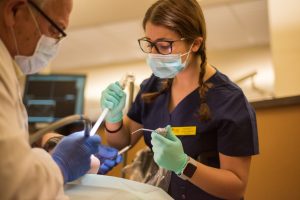What is Experiential Education?
Experience really can be a great teacher. Postsecondary students typically spend long hours taking notes in lectures or immersed in readings each week trying to get their heads around the complex ideas and theories that inform practices. Certainly, lectures and readings are potent instructional tools and students can learn effectively through exploration of theory alone. However, when students are also given an opportunity to engage in the authentic application of what they are learning about, whether in the lab, field, community, workplace, simulated environment or some other out-of-class, hands-on experience, it is often just what is needed to really solidify understanding and align theory and practice to the habits of mind and values that define vocations.
The Provost’s Task Force on Experiential Learning at the University of Windsor characterized the benefits for faculty, students and industry/community partners well on pages 4-6 in their report, “Experiential Education: A Path Toward Improving the Student Experience”:
- Increases motivation and engagement, encouraging self-directed learning;
- Facilitates the exploration of the relationship between academic theory and practice, increasing clarity around academic and career goals;
- Increases understanding and perceptions around workplace cultures;
- Enhances professional networks;
- Helps students better understand work realities and expectations;
- Provides opportunity to gain career-related experiences, clarifying employment and career goals;
- Builds leadership, technical, and professional skills;
- Increases confidence, maturity, and self-management;
- Improves problem-solving, critical thinking, research, communication, and teamwork skills;
- Develops skills to transition to the workforce;
- In cases of paid placements, provides earnings to assist with financial obligations; and
- Builds citizenship skills.
 Faculty/Institutional Benefits:
Faculty/Institutional Benefits:
- Attracts and retains high quality students;
- Strengthens links between the institution and the business, government and community organizations;
- Uses effective marketing and recruitment tool;
- Enhances reputation of the institution within the employment community;
- Aligns with government priorities;
- Increases employability of graduates, thereby increasing institutional employment rates;
- Increases alumni engagement as community partners;
- Increases partnership opportunities and financial support towards EL from community partners;
- Increases educator satisfaction;
- Helps faculty keep their knowledge current; and
- Provides opportunity to evaluate and improve curriculum.
 Employer and Community Benefits:
Employer and Community Benefits:
- Increases the diversity, energy, and enthusiasm within the workplace;
- Engages postsecondary institutions in responding to identified community need;
- Fosters additional collaboration with the university;
- Increases the profile of the community’s opportunities and challenges;
- Provides a new perspective to the delivery of programs, services and products;
- Helps organizations find solutions to specific business or industry needs; and
- Attracts and hires motivated and enthusiastic new employees
The benefits of including experiential education opportunities within postsecondary courses and programs are many and can result in positive outcomes for a broad range of people. During this course, you will explore those benefits, as well as some of the unique challenges and considerations for teaching through the use of forms of experiential learning. You will be able to think through the forms and applications of experiential education, what we have already learned from the theory and practice literature, and you will get to dig into the creation of teaching plans and documents that you would need to generate if you were to employ experiential education in a program or course that you had a role in designing. In each session, the learning outcomes for the session will appear early on in the session materials within the Sakai site as they do for this session. Look for these important milestones in the course that are noted in the Sakai site as you work your way through the sessions. The learning outcomes will be valuable in helping you to gauge your successful progress through the course.
As you consider the importance of structuring experiential learning opportunities within postsecondary programs, think for example, of what it would be like to train as a dental hygienist, counsellor, nurse, or financial advisor without actually practicing on clients under supervision during the program of study and learning from what went well, what needs improvement, and what should be avoided when actually out in the workforce. Or imagine what it would be like to aspire to build a career as an engineer, industrial designer, architect or landscaper without having real projects with real consequences to work on as part of your formal education? Or consider how you would be able to prepare yourself as a librarian or a teacher without stepping foot in a library or classroom as part of your formal education? It just wouldn’t inspire the same confidence in the choice of profession or in the student’s readiness to start a career as a combination of theory and hands-on experiences can offer.
Even programs of study in colleges and universities that are not tied directly to defined or prescribed professions benefit from the inclusion of real-world experiences that allow students to explore their passions and interests and learn about what kind of work environments and activities energize and satisfy them. A good example of how a real-world experience in an undergraduate program can open up opportunities would be the story of an English major who spent a co-op work term writing user manuals for a large software company and discovered a love of and a talent for technical writing. Or consider the story of the anthropology undergraduate who had an opportunity to develop a display of artifacts and guided tours for an historic military museum and cemetery as a service-learning course project. The experience led to a decision to pursue post-graduate studies in museum studies as a consequence. In both cases, the students uncovered a career path that they might not otherwise have taken.
Experiential learning supports students in applying their knowledge and conceptual understanding to practical problems or situations and provides them with an opportunity to consider their areas of strength and weakness, as well as areas of interest and passion, with the benefit of reflection following direct experience. Experiential education is highly valued by students, educators and employers for the ways in which it can connect town and gown, bring new insights and innovations into the classroom and the workplace through reciprocal relationships, and inspire and inform students in their choice of which career paths to pursue.


